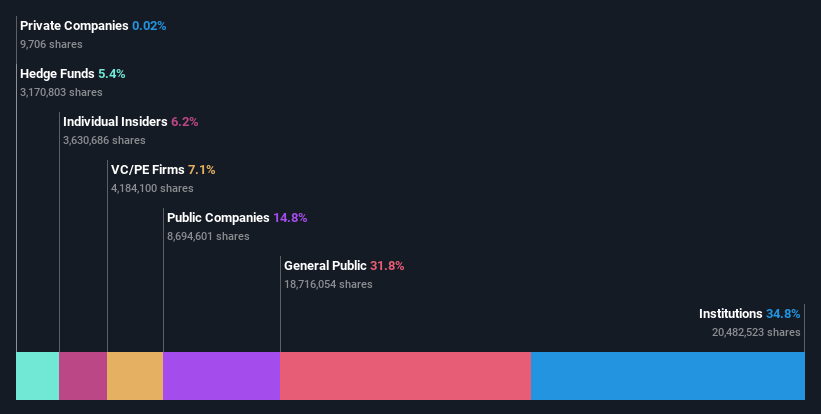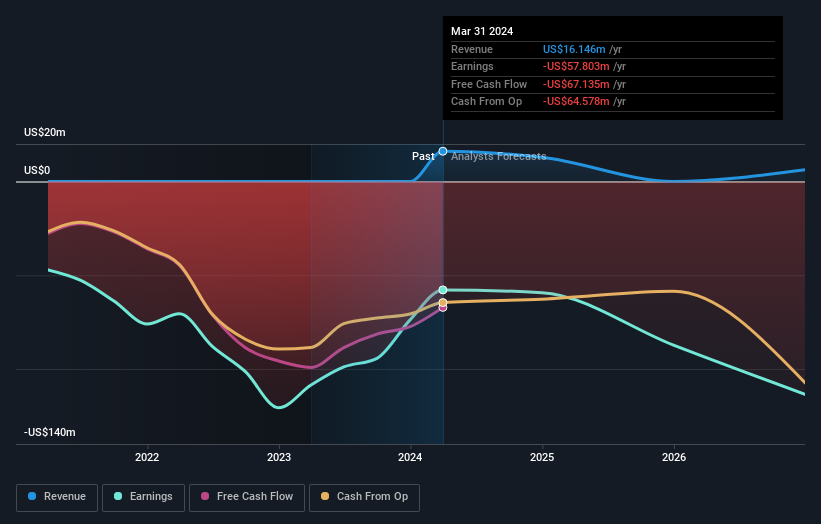Stock Analysis
- United States
- /
- Biotech
- /
- NasdaqGS:PYXS
Pyxis Oncology, Inc.'s (NASDAQ:PYXS) high institutional ownership speaks for itself as stock continues to impress, up 12% over last week

Key Insights
- Given the large stake in the stock by institutions, Pyxis Oncology's stock price might be vulnerable to their trading decisions
- A total of 10 investors have a majority stake in the company with 50% ownership
- Using data from analyst forecasts alongside ownership research, one can better assess the future performance of a company
Every investor in Pyxis Oncology, Inc. (NASDAQ:PYXS) should be aware of the most powerful shareholder groups. The group holding the most number of shares in the company, around 35% to be precise, is institutions. That is, the group stands to benefit the most if the stock rises (or lose the most if there is a downturn).
And as as result, institutional investors reaped the most rewards after the company's stock price gained 12% last week. One-year return to shareholders is currently 31% and last week’s gain was the icing on the cake.
In the chart below, we zoom in on the different ownership groups of Pyxis Oncology.
View our latest analysis for Pyxis Oncology

What Does The Institutional Ownership Tell Us About Pyxis Oncology?
Many institutions measure their performance against an index that approximates the local market. So they usually pay more attention to companies that are included in major indices.
As you can see, institutional investors have a fair amount of stake in Pyxis Oncology. This can indicate that the company has a certain degree of credibility in the investment community. However, it is best to be wary of relying on the supposed validation that comes with institutional investors. They too, get it wrong sometimes. It is not uncommon to see a big share price drop if two large institutional investors try to sell out of a stock at the same time. So it is worth checking the past earnings trajectory of Pyxis Oncology, (below). Of course, keep in mind that there are other factors to consider, too.

Our data indicates that hedge funds own 5.4% of Pyxis Oncology. That's interesting, because hedge funds can be quite active and activist. Many look for medium term catalysts that will drive the share price higher. Our data shows that Pfizer Inc. is the largest shareholder with 10% of shares outstanding. For context, the second largest shareholder holds about 7.4% of the shares outstanding, followed by an ownership of 7.1% by the third-largest shareholder. In addition, we found that Lara Sullivan, the CEO has 3.2% of the shares allocated to their name.
We did some more digging and found that 10 of the top shareholders account for roughly 50% of the register, implying that along with larger shareholders, there are a few smaller shareholders, thereby balancing out each others interests somewhat.
While it makes sense to study institutional ownership data for a company, it also makes sense to study analyst sentiments to know which way the wind is blowing. There are a reasonable number of analysts covering the stock, so it might be useful to find out their aggregate view on the future.
Insider Ownership Of Pyxis Oncology
The definition of company insiders can be subjective and does vary between jurisdictions. Our data reflects individual insiders, capturing board members at the very least. Company management run the business, but the CEO will answer to the board, even if he or she is a member of it.
I generally consider insider ownership to be a good thing. However, on some occasions it makes it more difficult for other shareholders to hold the board accountable for decisions.
Shareholders would probably be interested to learn that insiders own shares in Pyxis Oncology, Inc.. In their own names, insiders own US$14m worth of stock in the US$233m company. Some would say this shows alignment of interests between shareholders and the board. But it might be worth checking if those insiders have been selling.
General Public Ownership
The general public-- including retail investors -- own 32% stake in the company, and hence can't easily be ignored. While this size of ownership may not be enough to sway a policy decision in their favour, they can still make a collective impact on company policies.
Private Equity Ownership
Private equity firms hold a 7.1% stake in Pyxis Oncology. This suggests they can be influential in key policy decisions. Sometimes we see private equity stick around for the long term, but generally speaking they have a shorter investment horizon and -- as the name suggests -- don't invest in public companies much. After some time they may look to sell and redeploy capital elsewhere.
Public Company Ownership
We can see that public companies hold 15% of the Pyxis Oncology shares on issue. This may be a strategic interest and the two companies may have related business interests. It could be that they have de-merged. This holding is probably worth investigating further.
Next Steps:
I find it very interesting to look at who exactly owns a company. But to truly gain insight, we need to consider other information, too. Be aware that Pyxis Oncology is showing 4 warning signs in our investment analysis , and 2 of those are potentially serious...
If you would prefer discover what analysts are predicting in terms of future growth, do not miss this free report on analyst forecasts.
NB: Figures in this article are calculated using data from the last twelve months, which refer to the 12-month period ending on the last date of the month the financial statement is dated. This may not be consistent with full year annual report figures.
Valuation is complex, but we're helping make it simple.
Find out whether Pyxis Oncology is potentially over or undervalued by checking out our comprehensive analysis, which includes fair value estimates, risks and warnings, dividends, insider transactions and financial health.
View the Free AnalysisHave feedback on this article? Concerned about the content? Get in touch with us directly. Alternatively, email editorial-team (at) simplywallst.com.
This article by Simply Wall St is general in nature. We provide commentary based on historical data and analyst forecasts only using an unbiased methodology and our articles are not intended to be financial advice. It does not constitute a recommendation to buy or sell any stock, and does not take account of your objectives, or your financial situation. We aim to bring you long-term focused analysis driven by fundamental data. Note that our analysis may not factor in the latest price-sensitive company announcements or qualitative material. Simply Wall St has no position in any stocks mentioned.
Valuation is complex, but we're helping make it simple.
Find out whether Pyxis Oncology is potentially over or undervalued by checking out our comprehensive analysis, which includes fair value estimates, risks and warnings, dividends, insider transactions and financial health.
View the Free AnalysisHave feedback on this article? Concerned about the content? Get in touch with us directly. Alternatively, email editorial-team@simplywallst.com
About NasdaqGS:PYXS
Pyxis Oncology
A clinical stage company, engages in the development of therapeutics to treat cancers.
Flawless balance sheet with concerning outlook.

